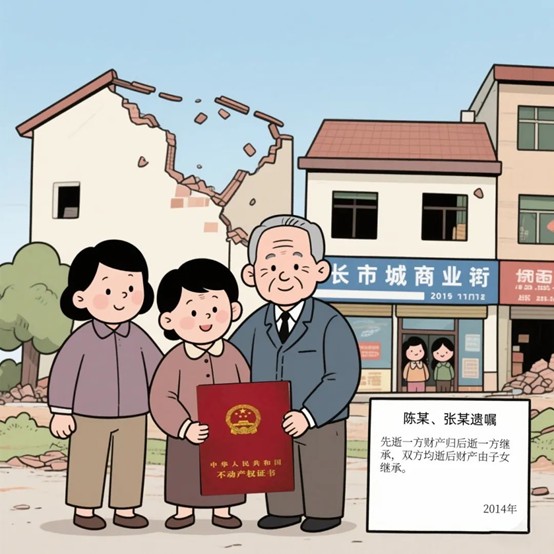Basic Case Facts
Chen and Zhang registered their marriage in 1964 and had one son and two daughters. In 2014, the elderly couple jointly signed a will, stating: "The property of the first deceased party shall be inherited by the surviving party; after both parties pass away, the property shall be inherited by their children."

In January 2015, the self-built house under the couple’s name was faced with demolition due to urban reconstruction. As they were advanced in age, they entrusted their eldest son to handle all demolition-related matters. In the demolition compensation process, with the consent of the elderly couple, the house was replaced with a commercial storefront in a business district, and the ownership of the storefront was registered in the name of the eldest son’s daughter (their granddaughter). After Chen and Zhang passed away, their two daughters raised objections to the inheritance left by their parents, claiming that the storefront and its rental income were also part of the inheritance. They then sued their eldest brother and his daughter to the court, requesting the division of all inheritance shares of the deceased Chen and Zhang.
Court Trial
The court held that the "Joint Will" written by the deceased Chen and Zhang, submitted by the two plaintiffs, contained specific content, a signed date, and signatures. Although the will did not clearly specify the division ratio, the testators’ intention was clear and the expression was complete, so it should be recognized as a valid holographic will. The focus of dispute in this case was whether the storefront and its rental income belonged to the inheritance.
The court determined that for the storefront registered in the granddaughter’s name: first, during the demolition and resettlement, Chen and Zhang had fully entrusted their eldest son to handle the matter, and the signed House Replacement Agreement, Resettlement Compensation Agreement, and House Deregistration Certificate represented the true intention of the elderly couple; second, in December 2017, when the house was actually delivered, Chen signed the delivery registration form to confirm that the property certificate would be issued in the granddaughter’s name; third, the Resettlement Compensation Agreement stipulated that no transition fees, old house demolition compensation fees, or house demolition relocation bonuses would be paid separately due to the house replacement, and neither Chen nor Zhang had raised any objections to the unpaid transition fees, old house demolition compensation fees, or house demolition relocation bonuses from the signing of the Resettlement Compensation Agreement in February 2015 until their successive deaths. Therefore, the fact that Chen and Zhang gave the storefront to their granddaughter as a gift had reached a high degree of probability, and the storefront did not belong to the inheritance of the deceased Chen and Zhang; similarly, the rental income generated from the storefront also did not belong to the inheritance.
Judge’s Interpretation
When disputes arise between the effect of real right registration and will succession, from a legal perspective, real right registration has crucial effect. Article 209, Paragraph 1 of the Civil Code of the People’s Republic of China stipulates: "The creation, modification, transfer, and extinction of real rights in immovables shall become effective upon registration in accordance with the law; without registration, they shall not become effective, except as otherwise provided by law." This indicates that in China, the registration of real rights in immovables is a valid condition for the creation of such rights. In this case, the elderly couple agreed to register the ownership of the commercial storefront in the granddaughter’s name; from the moment the real right registration was completed, the granddaughter became the legal owner of the storefront in the eyes of the law. Real right registration is a way to publicly declare the ownership of real rights and has credibility, aiming to protect transaction security and the reliance interests of third parties. The elderly couple voluntarily registered the ownership of the storefront in the granddaughter’s name, and this act conformed to the statutory formal requirements for the transfer of real rights and was legally valid.
In terms of will succession, Article 1133 of the Civil Code of the People’s Republic of China stipulates: "A natural person may, in accordance with the provisions of this Law, make a will to dispose of his personal property and may designate a testamentary executor. A natural person may make a will to designate one or more of his statutory heirs to inherit his personal property. A natural person may make a will to donate his personal property to the state, a collective, or an organization or individual other than the statutory heirs." Will succession is a form of inheritance where the heir(s) of the inheritance and the distribution of the inheritance are determined in accordance with the valid will made by the decedent. It should be clearly noted that the property disposed of in a will shall be the lawful personal property left by the decedent upon his death. In this case, since the elderly couple had transferred the ownership of the storefront to their granddaughter through real right registration during their lifetime, the storefront no longer belonged to their personal property when they passed away. Therefore, the storefront could not be inherited as part of the elderly couple’s inheritance in accordance with the will.
This article is reprinted from the WeChat official account "Yufa Yangguang" (Henan Judiciary Sunshine), and we express our gratitude here!